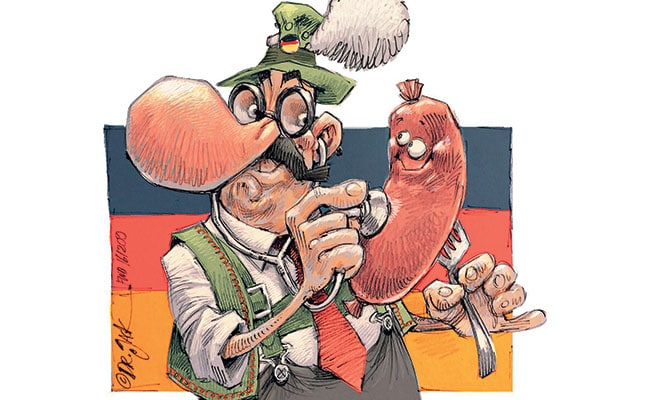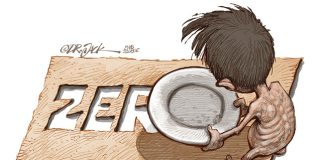
In recent years, no topic has been as controversial in German society as the production conditions of farm animals. It is closely followed by antibiotic use in livestock production and the resulting potential development of antibiotic-resistant diseases.
Increasing numbers of German consumers want their food to be of the best quality and free of health risks, as well as come from farms practising animal-friendly production methods.
Animal welfare initiatives, animal protection labels, and legislative and voluntary policy initiatives aimed at greater animal protection have been launched in Germany at national, state and regional levels to meet these consumer demands. Although there has been encouraging progress, lack of agreement still exists in German society about what animal husbandry of the future should look like.
The large number of animal welfare initiatives in Germany means that consumers no longer have a clear overview of the situation. Instead of coordinated milestones along the route to socially accepted animal husbandry, they are seeing competing individual solutions that role players use to set themselves apart.
What is needed is a strategy and an institution to filter out feasible options from the current diversity of proposals.
In addition, Germany’s drive for improved farm animal welfare currently does not factor in the importance of integrating animal health issues, and thus the views of veterinarians on the subject.
Caught between the demands for the protection of consumer health, animal welfare and farm profitability, the health of farm animals assumes a key position.
Animal and human health are inter-dependent
Human health depends to a large extent on animal health, and maintaining the former is an important contributing factor to the improvement of the welfare of farm animals.
Healthy animals are a livestock farmer’s business capital. Infections, parasitoses, udder diseases and metabolic or fertility problems all impair the performance capability of livestock, and thus the economic prospects of the farm.
The profitability of the German livestock production sector is precarious and there is increasing concern about the sector’s financial sustainability.
Given this, it is important to note that every German farm has a 10% to 30% untapped potential directly related to herd or flock health. The basis of successful farming remains healthy animal stock, and it is therefore vital for Germany to implement European Union (EU) animal health legislation in such a way that regular vet visits to herds and flocks become compulsory.
Veterinary herd healthcare provides a valuable service in terms of animal welfare and consumer health protection, as well as legal protection for the farmer as food producer. Having healthy animals facilitates the profitable production of high-quality food products.
Integrating veterinary herd healthcare into the production process will lower treatment costs, and ensure more targeted use of veterinary medicines, such as optimising antibiotic use.
Multi-antibiotic resistance – german success
In a survey of 24 countries in the EU between 2011 and 2014, only a 12% decline in antibiotic sales for animal husbandry was recorded. In Germany, however, annual antibiotic sales by pharmaceutical companies to vets have halved from about 1 700t to 800t in the space of five years.
Despite this achievement, German vets and members of the agricultural sector must still make further efforts to prevent the development of multi-antibiotic resistant organisms in animal husbandry.
The veterinary herd and flock management model for large operations of the future will therefore actively involve farm vets in the healthcare management of farm animals. With the aid of data analysis from a herd/flock management programme, vets are in an ideal position to integrate animal health with farm economics.
Data from the farms that subscribe to this service are generated automatically.
An example is dairy cattle, for which the milk content values of fat, protein, milk urea, lactose and the somatic cell count are determined in the milk yield recording process.
Working with a livestock farmer, the farm vet can collect and analyse additional information such as health treatments, animal observations, inseminations, calving, diagnoses, feeding and rations, lactation, and the lifetime productivity of individual animals.
These are all parameters that specifically affect German livestock farms’ production and financial results. From the data collected, it is possible to derive farm-specific and individual animal analyses, and identify processes and cycles. These can be used to generate graphs and other information to be used to improve animal health and welfare.
Veterinary services can contribute to profits
By identifying potential animal health problems early enough, vets can either prevent them or minimise their impact. Veterinary services can thus be turned from a cost factor into one that can contribute to profitability for German livestock farming businesses.
Thanks to holistic and sustainable animal health and hygiene management, German farmers will thus receive comprehensive and ongoing support. By taking commercial aspects into account, all operations relating to animal housing that contribute to animal health and productivity can also be routinely monitored to ensure that they are optimised.
The Bundesverband Praktizierender Tierärzte (Federal Association of Practising Veterinarians) has been actively involved in this development for years.
The guidelines it has developed in conjunction with experts from the cattle, pig and poultry sectors with regard to proper veterinary management of livestock and poultry ensure that vets comply with the relevant statutory regulations.
The time has come to assign greater importance to animal health in the public debate about animal welfare and the future of animal husbandry in Germany. – Lloyd Phillips
The views expressed in our weekly opinion piece do not necessarily reflect those of Farmer’s Weekly.
Emal Dr Siegfried Moder at [email protected] or visit tieraerzteverband.de.
This presentation was given at the EuroTier dairy, pork and poultry technologies exhibition held in Hannover, Germany, from 15 to 18 November.













